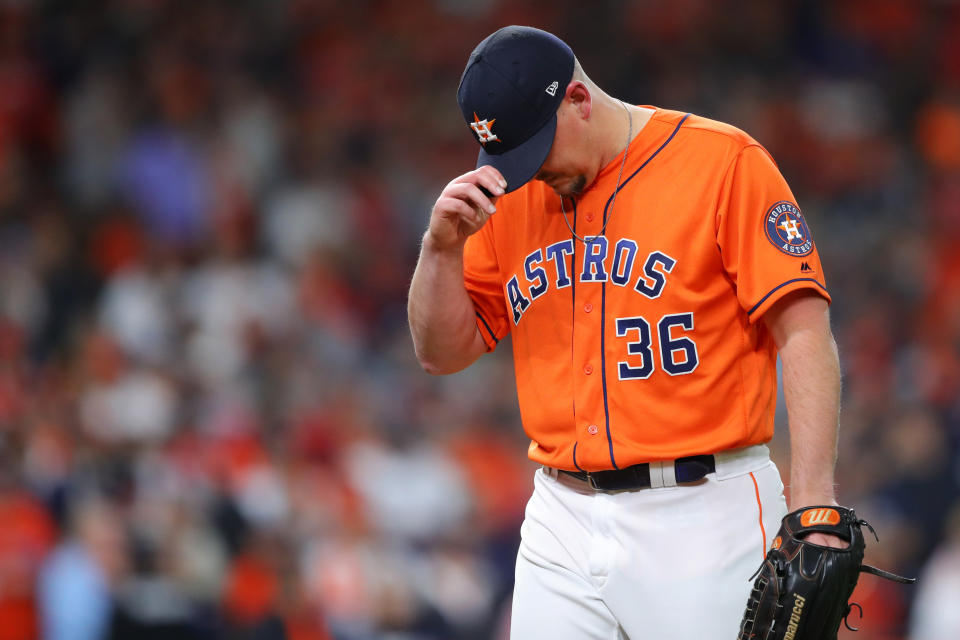MLB Roundtable: What punishment should the Astros get in sign-stealing scandal?
In an offseason filled with a startling number of negative headlines for Major League Baseball, one scandal has stood out above the rest.
The Houston Astros have been accused of stealing signs through illegal, electronic methods by pitcher Mike Fiers. And now MLB has launched a full-scale investigation that ranges from 2017 through 2019 and encompasses front-office executives, scouts, coaches, former coaches and, of course, the players.
It’s a major story that has stirred paranoia within the game and will surely have major repercussions once the league determines what was done and how deep the alleged scheme runs.
The debate we often hear now is what would make for a fair and realistic punishment for the Astros and anyone else determined to have participated in a similar scheme. The responses are typically wide-ranging. That was no different when we asked the Yahoo Sports crew what punishment they would hand out if the Astros story is as bad as it sounds.

A.J. Hinch suspended for season, forfeit three first-round picks
MLB has been criticized from within for not enforcing its sign-stealing policy strongly enough. Now is their opportunity to send a message that using electronic methods will not be tolerated. If the evidence fully supports it, MLB should suspend Astros manager A.J. Hinch for the entire season. It may not have been his idea, but the players are his responsibility. The league should punish the front office by taking away a first-round pick for each season the scheme was taking place. At this point, that would be three. Any players or coaches involved should also face 5- to 10-game bans depending on their level of involvement. (Mark Townsend)
Months-long suspensions
A little more than two years ago, when he’d determined the Boston Red Sox had used an Apple Watch for reasons other than time telling or heart-rate monitoring, commissioner Rob Manfred fined the Red Sox and announced what amounted to a zero-tolerance policy moving forward. Future instances of technology-driven, in-game spying would result in stiff and lasting penalties. The investigation into the Houston Astros seems already to have answered the question as to whether the Astros cheated, and now asks who and for how long and to what effect. Those answers are almost sure to reflect poorly on general manager Jeff Luhnow and manager A.J. Hinch, among others. Suspensions that follow should be measured not in days or even weeks, but in months. As important, the same discipline ought to follow those found complicit who are no longer with the Astros and have since affiliated with other organizations. (Tim Brown)
Bans, draft picks and fines
If MLB actually wants to come down hard on the Astros, the team's punishment needs to be more than a few suspensions and a small fine. At minimum, MLB should be talking about banning members of the organization — either temporarily or permanently — taking away multiple draft picks and levying a fine that will actually impact the club. Over the past couple seasons, the Astros have gotten nothing more than a wrist slap for repeatedly engaging in awful conduct or questionable tactics. The team wasn't punished after the Kyle McLaughlin incident or Brandon Taubman fiasco. It benefitted from acquiring Roberto Osuna while he was serving a domestic-violence suspension and still got to use Yuli Gurriel in the World Series after Gurriel made a racist gesture toward Yu Darvish.
By not acting, MLB has enabled the team to become bolder in its desire to game the system. MLB needs to offer up severe consequences if it finally wants to put a stop to the Astros' nonsense. (Chris Cwik)
No half measures
Major League Baseball has never proven itself too proactive when it comes to policing “cheating” — however you want to use that word. More often than not, the league office in the past has sounded like a parent threatening to take away a toy from a misbehaving child. Big threats, little follow-through. Consider how MLB handles pitchers who doctor the ball. It’s explicitly against the rules, but the league doesn’t really crack down on it unless the violations are particularly egregious.
When the Red Sox were in the middle of that Apple Watch controversy and the end result was a fine AND a fine for the Yankees, that sent a pretty clear message that this stuff was getting slap-on-the-wrist treatment. Heck, that’s probably why it’s come to this with the Astros. I don’t know the specifics of the case like MLB investigators do, and my colleagues have done a fine job here of judging hypotheticals, but here’s what I think is most important — whatever the fair punishment seems to be, make it a little tougher than that. No more half measures. Baseball needs to send a message that it’s taking these things seriously. Unless, of course, it isn’t. (Mike Oz)
More from Yahoo Sports:

